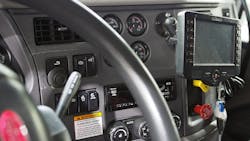'Too expensive, unproven, untrustworthy': Groups push for ELD delay
The most polarizing topic in trucking today — electronic logging devices, or ELDs — isn't losing any steam.
With the deadline less than 12 weeks away for most commercial truck drivers to be using ELDs in recording their hours of service, groups representing owner-operators, small trucking companies, agricultural and livestock trucking and others reiterated their calls today for a delay.
The delays they're seeking would push the ELD mandate's current Dec. 18, 2017 deadline out another one or two years, appealing either to Congress and President Trump or the U.S. Dept. of Transportation (DOT).
The Owner-Operator Independent Drivers Association (OOIDA) led a 31-organization coalition in calling for passage of a bill U.S. Rep. Brian Babin (R-TX) introduced back in July — the ELD Extension Act of 2017 (HR 3282) — that would postpone the ELD implementation deadline till December 2019.
"The electronic logging device mandate is written so broadly that it has far-reaching implications well beyond the traditional trucking industry," said Todd Spencer, executive vice president of OOIDA.
The coalition argued the mandate should be delayed until the Federal Motor Carrier Safety Administration (FMCSA) addresses "numerous unresolved issues identified by impacted stakeholders." Those include self-certification of ELDs, which the coalition finds unreliable; potential connectivity problems in some areas or cybersecurity vulnerabilities with ELDs; and the ability of law enforcement officers to access ELD data.
OOIDA also contends that requiring ELDs on commercial vehicles does not advance safety, arguing that the devices "are no more reliable than paper logbooks for recording compliance with hours-of-service regulations."
Not ready
The Agricultural Retailers Assn. (ARA), which is part of the coalition supporting HR 3282, also directly asked DOT and the Trump administration to delay the coming December deadline for using ELDs for a year.
"ARA is concerned that many agribusinesses are not, and will not be, fully prepared to meet the Dec. 18, 2017, compliance deadline," said Richard Gupton, senior vice president of public policy and counsel for ARA. "Moreover, ELD manufacturers may not be able to accommodate existing Hours of Service exemptions currently being utilized by agricultural retailers and distributors."
ARA's arguments echo those of the coalition. The group pointed to ELD self-certification, noting that FMCSA itself is not reviewing and certifying the devices but rather relying on the ELD manufacturers to do so.
Yet that hasn't stopped manufacturers from blurring that fact in advertising. "There are manufacturers in the marketplace claiming their ELD product is 'FMCSA-certified'," ARA stated. The group called for FMCSA to establish "a similarly stringent process" to that by which the agency authorizes a physician or other health care practitioner to be a Certified Medical Examiner for commercial drivers.
ARA also suggested that the costs of ELDs will be too great, including the initial price tag for the devices as well as potential ongoing costs such as maintenance or service contracts with ELD providers or driver training.
Those costs amount to "an unnecessary financial burden" for the trucking industry, which ARA said already is facing "a soft economy, lagging commodity prices and the massive economic losses following Hurricanes Harvey and Irma as well as other weather-related disasters."
Yin and Yang
Meanwhile, responding to the ARA and coalition calls for an ELD mandate delay, the Trucking Alliance — a.k.a. the Alliance for Driver Safety & Security, an organization supported by some key players in the ELD industry and a number of larger carriers — essentially called the groups' anti-ELD arguments hogwash.
"Electronic logging devices, or ELDs, will unquestionably reduce truck driver fatigue. ELDs will reduce large truck accidents on our nation's highways. ELDs will make it easier for law enforcement to verify how many hours a driver has been behind the wheel," contended Lane Kidd, managing director of the Trucking Alliance.
"Further, Congress has voted numerous times and as recently as a few days ago to require ELDs," Kidd added. "The federal courts have upheld their congressional action. Yet OOIDA and other groups continue to ignore these facts, suggesting the rule may not happen, and are now taking their members perilously close to having their trucks taken out of service for not installing them."
Regardless of your opinion on ELDs, there's evidence this issue is inching closer and closer to falling off a cliff.
Just this week at TU Automotive's Connected Fleets conference in Atlanta, for instance, a study of 529 U.S. fleet operators released by C.J. Driscoll & Associates found there's a long ways to go yet when it comes to ELDs. A solid majority — 60% — of commercial fleets included in the study were still using paper logs to monitor drivers' hours of service.
In the same study, not a single one of the respondent owner-operators, the demographic perhaps most opposed to ELDs, had implemented an ELD or planned to do so by Dec. 18.
About the Author
Aaron Marsh
Aaron Marsh is a former senior editor of FleetOwner, who wrote for the publication from 2015 to 2019.
